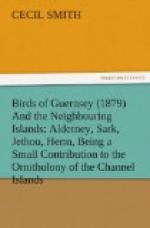I have no doubt that Mr. MacCulloch is right that the cherry orchards, to say nothing of other fruit trees, tempted the Golden Orioles to remain to breed in the Island, for they are “grand gobeurs” not only of “cerises,” but of many other sorts of fruit, particularly of grapes and figs—in grape countries, indeed, doing a deal of damage amongst the vineyards. This damage to grapes would not, however, be much felt in Guernsey, as all the grapes are protected by orchard-houses. But though the grapes are protected, and most, if not all, the cherry orchards cut down, still there is plenty of unprotected fruit in Guernsey to tempt the Golden Oriole to remain in the Islands, and to bring the wrath and the gun of the gardener both to bear upon him when he is there. This, however, only shows that from the time spoken of by Mr. Metivier down to the present time very few Golden Orioles could have visited Guernsey, and still fewer remained to breed; for what with their fruit-eating propensities and their bright plumage, hardly a bird could have escaped being shot and subsequently making its appearance in the bird-stuffers’ windows, and affording a subject for a notice in the ‘Star,’ or some other paper. I think therefore, on the whole, that though Guernsey still affords many temptations to the Golden Oriole, and is sufficiently well-wooded to afford shelter to suit its shy and suspicious habits, yet for some reason or other the bird has not visited the Island of late years even as an accidental visitant, or, if so, very rarely.
The Golden Oriole is mentioned in Professor Ansted’s list, and marked as having occurred in Guernsey and Sark, but nothing more is said about the bird. Probably Guernsey was mentioned as a locality on account of the female specimen in the Museum, but with this exception I have never heard of its making its appearance in Sark even as a straggler.
21. DIPPER. Cinclus aquaticus, Bechstein. French, “Aquassiere,” “Cincle plongeur.”—The Dipper or Water Ouzel, though not very common, less so, indeed, than the Kingfisher, is nevertheless a resident species, finding food all through the year in the clear pools left by the tide, and also frequenting the few inland ponds, especially the rather large ones, belonging to Mr. De Putron in the Vale, where there is always a Dipper or a Kingfisher to be seen, though I do not think the Dipper ever breeds about those ponds—in fact there is no place there which would suit it; but though I have never found the nest myself in Guernsey, I have been informed, especially by Mr. Gallienne, that the Dipper makes use of some of the rocky bays, forming his nest amongst the rocks as it would on the streams of Dartmoor and Exmoor.
Captain Hubboch, however, writes me word he saw one in Alderney in the winter of 1861-62, and there seems no reason why a few should not remain there throughout the year as in Guernsey.




